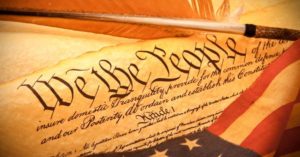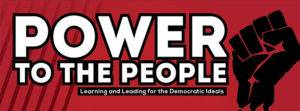
 We the People of the United States, in order to form a more perfect Union, establish Justice, insure domestic Tranquility, provide for the common defense, promote the general Welfare, and secure the Blessings of Liberty to ourselves and our Posterity, do ordain and establish this Constitution for the United States of America.
We the People of the United States, in order to form a more perfect Union, establish Justice, insure domestic Tranquility, provide for the common defense, promote the general Welfare, and secure the Blessings of Liberty to ourselves and our Posterity, do ordain and establish this Constitution for the United States of America.
It is the Shabbat within Hanukah (as it is an eight-day holiday, there is always one)
Six13 brings us this great medley mash-up of Hanukah meets West Side Story.
Enjoy, with candles and sufganiyot!
Chag Urim Sameach and Shabbat Shalom
Shabbat Shalom
 June 19th is celebrated in American history as the date when the slaves were freed (it actually was the day when Union Troops entered Texas to enforce the final ending of slavery on June 19, 1865, three years after Lincoln’s Emancipation Proclamation of Sept 22, 1862). Juneteenth, as it is known, remains an aspiration. Today, in this special moment in time we find so much of America is still unfulfilled; Ideals yet to be achieved, dreams yet to realized. America was the Promised Land for so many, but the promise is a work in progress, a distant goal for far too many.
June 19th is celebrated in American history as the date when the slaves were freed (it actually was the day when Union Troops entered Texas to enforce the final ending of slavery on June 19, 1865, three years after Lincoln’s Emancipation Proclamation of Sept 22, 1862). Juneteenth, as it is known, remains an aspiration. Today, in this special moment in time we find so much of America is still unfulfilled; Ideals yet to be achieved, dreams yet to realized. America was the Promised Land for so many, but the promise is a work in progress, a distant goal for far too many.
On this Juneteenth let us affirm our commitment to make this special place one that extends ideals of equal justice, liberty, and equality to everyone. It is a long road ahead, but it is a journey worth traveling.
Find a group that promotes our sacred values such as the ADL, the ACLU, the Innocence Project, Repairers of the Breach, and support them. Learn how to help create the changes to make our society juster and fairer for all. Celebrate Freedom on Juneteenth and every day thereafter.
We still believe that there is a better place, a promised land, and the way there is through the wilderness. There is no way for us to get from here to there, except by joining hands, marching together. (Mishkan Tefillah, adapted)
If you can, be at the rally in New York this Sunday to express solidarity as a first step toward achieving the values that are at the center of Judaism and America. Together as the Jewish community of the United States with all others of goodwill, we will overcome forces of hatred and bigotry. There is much work to be done and miles to go before we sleep. Together we can get there.
Stopping by Woods on a Snowy Evening
By Robert Frost
Whose woods these are I think I know.
His house is in the village though;
He will not see me stopping here
To watch his woods fill up with snow.
My little horse must think it queer
To stop without a farmhouse near
Between the woods and frozen lake
The darkest evening of the year.
He gives his harness bells a shake
To ask if there is some mistake.
The only other sound’s the sweep
Of easy wind and downy flake.
The woods are lovely, dark and deep,
But I have promises to keep,
And miles to go before I sleep,
And miles to go before I sleep.
Shabbat Shalom
 The harsh reality of gun violence is that we are okay with it. In the aftermath of a shooting, we feel something for a while, but three weeks later, the immediacy of a particular event has passed and we go about our daily routine. Our culture seems to say that it is acceptable to kill people. Ironically, we can use the death penalty to punish people who commit these crimes, but we are unwilling to take preemptive action. In other words, it is okay if we are unwilling to take back our power to change this and let the status quo and carnage remain in place.
The harsh reality of gun violence is that we are okay with it. In the aftermath of a shooting, we feel something for a while, but three weeks later, the immediacy of a particular event has passed and we go about our daily routine. Our culture seems to say that it is acceptable to kill people. Ironically, we can use the death penalty to punish people who commit these crimes, but we are unwilling to take preemptive action. In other words, it is okay if we are unwilling to take back our power to change this and let the status quo and carnage remain in place.
We protest such a view responding that we support government action such as enhanced background checks, assault weapon bans, magazine limits, robust mental health services, training, and other measures. All of these are both legitimate and important, but we are still part of the problem if we do not demand these changes from our politicians! If stores like Walmart can hear us and limit ammunition sales and eliminating automatic weapons from the shelves, then why are the politicians deaf to us? Perhaps it is because we tacitly permit them to be so.
Our politicians are unwilling to engage in the debate on the issues, both root causes and how to effectively counteract them. The red flag laws and the Toomey-Manchin Bill have died ignominious deaths due to feckless politicians. The power is ours and we can demand action using this issue as a litmus test. But that is not enough. Keeping ourselves safer also requires that we act now until such time as we get that comprehensive and thoughtful action from our government officials. There are things we can do immediately that can substantially reduce gun violence right now.
The sad facts are that most gun deaths are caused by suicide, inner-city warfare, and crimes of passion and accidents. Curtailing these require enforcement of laws and providing the resources to make that possible. We need to demand our politicians are responsive but also more closely watch the debate and how our tax dollars are spent. We need to thoughtfully spend more to do the things we want to be done.
Public shootings would be substantially reduced by creating substantive security measures in public places. Detectors and security guards at the entry points of schools, malls, hotels, and all other places where people congregate. Israel had great success controlling terror through employing such measures. The only thing keeping us from similar success is an unwillingness to pay for it as well as the perceived discomfort these checkpoints might create. And we also need to remember that despite every effort, some incidents cannot be prevented. But we must try in order to protect our people.
It is up to us. We have the power to change this if we have the courage to do the things that need to be done. The polls say we are a substantial majority. Let’s use the power we the people have.